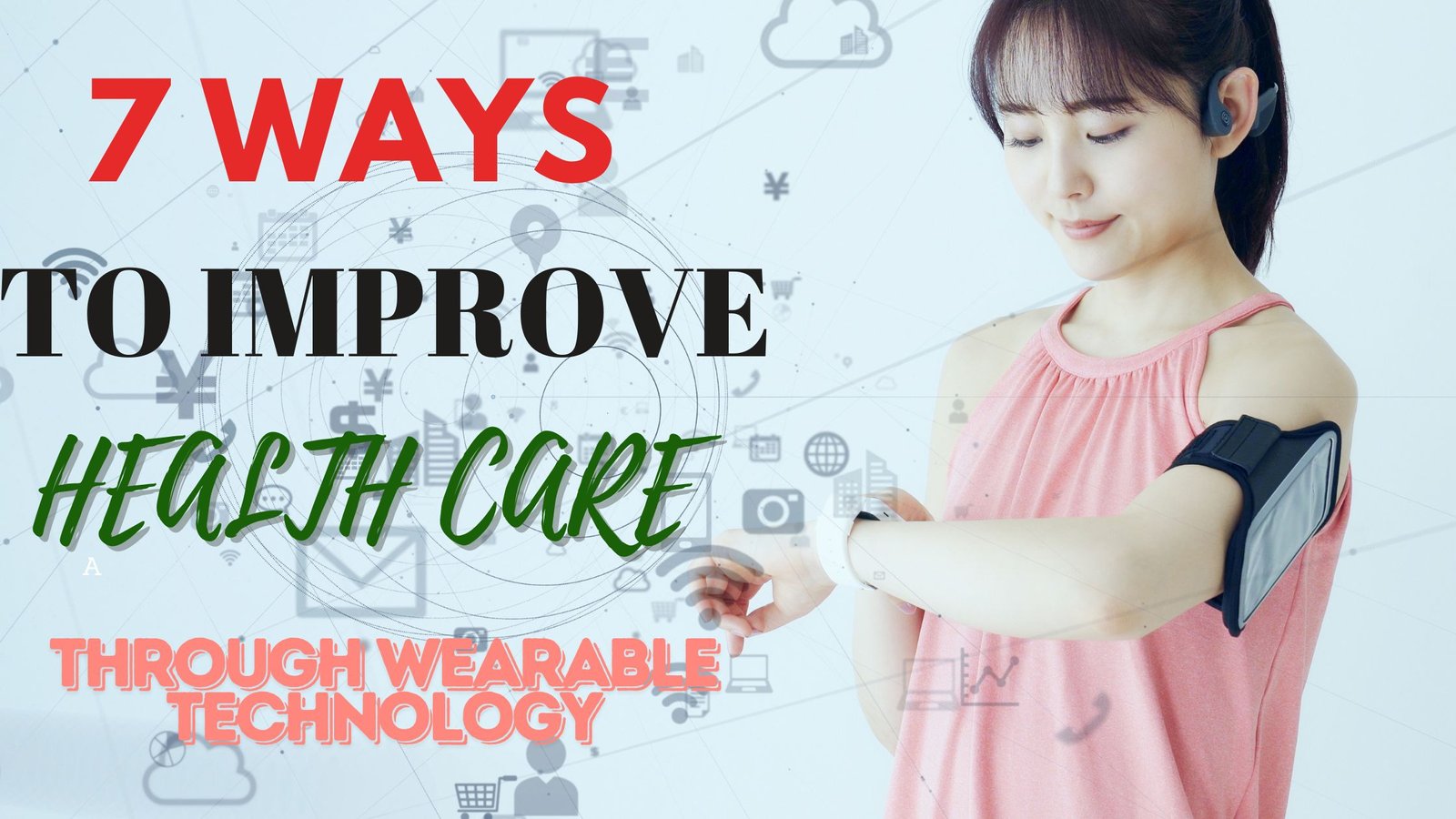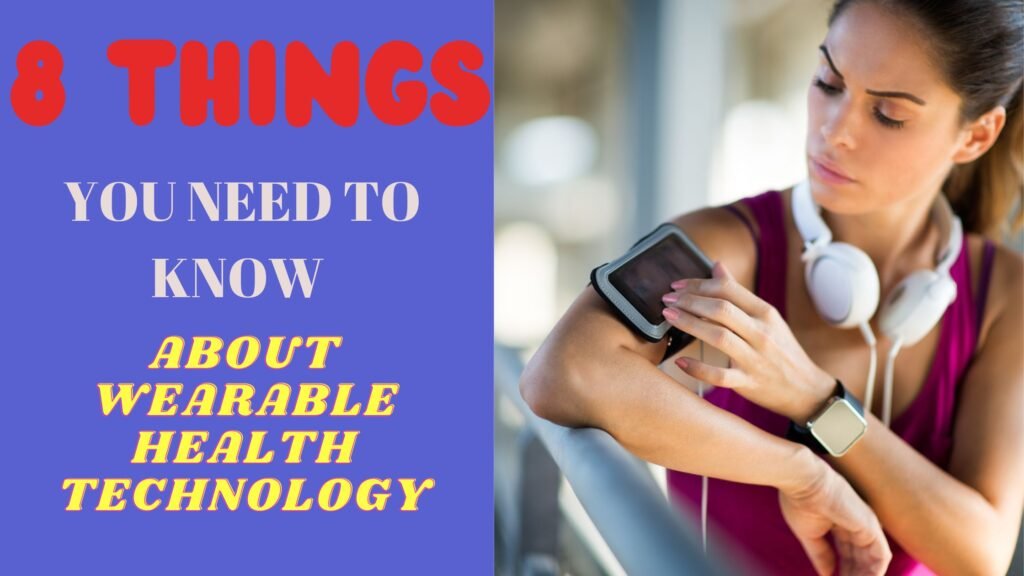Transforming Healthcare with Wearable Technology
Wearable technology is a game-changer in the realm of electronic healthcare.
This can transform the way we monitor and manage our health.
From smartwatches that track our daily activity to advanced medical devices .
All capable of monitoring vital signs, is changing healthcare in numerous ways.
Let’s look at the impact of wearable technology on the electronic healthcare landscape. And at the same time,look into the myriad benefits it offers to patients and individuals striving to maintain good health.
Enhancing Patient Care with Wearable Medical Devices
Wearable medical devices are poised to transform patient care by providing continuous monitoring and real-time data insights.
These innovative devices, however, offer a range of health benefits for patients with various medical conditions.
Thus empowering them to take control of their well-being.
Here are three significant health benefits of wearable technology for patients:
1. Continuous Health Monitoring
Wearable devices have advanced sensors that enable continuous monitoring of vital signs. For example, heart rate, blood pressure, and oxygen saturation.
For individuals with chronic health conditions, these devices provide invaluable real-time data, allowing for early intervention and personalized treatment plans.

2. Remote Patient Management
Wearable technology facilitates remote patient management, allowing healthcare providers to monitor patients’ health status from a distance.
This is particularly beneficial for individuals with mobility limitations. Or those residing in remote areas, as it ensures timely intervention and proactive care management.
3. Personalized Health Insights
By collecting and analyzing data on a user’s activity, sleep patterns, and physiological parameters, wearable devices offer personalized health insights.
Secondly,this data-driven approach enables individuals to make informed decisions about their lifestyle. Especially medication adherence and overall well-being, leading to improved health outcomes.
Applications of Wearable Technology for Maintaining Good Health
Beyond its impact on patient care, wearable technology holds immense potential for promoting good health and wellness. By leveraging the capabilities of wearables, individuals can proactively monitor their health, stay physically active, and adopt healthier habits. Here are some key ways in which wearable technology can be applied to maintain good health:
1. Fitness Tracking and Goal Setting
Wearable fitness trackers and smartwatches empower users to set fitness goals.
These are things like tracking physical activity, and monitor their progress over time. These devices serve as motivational tools, encouraging individuals to stay active and engage in regular exercise.
This, in the long run, contributes to improved fitness and overall health.
2. Stress Management and Mental Well-being
Some wearable devices incorporate features for stress monitoring and mental well-being.
This helps to provide insights into stress levels, relaxation techniques, and mindfulness practices. By promoting awareness of stress patterns and offering strategies for stress reduction, wearables play a role in supporting mental wellness and holistic health.
3. Sleep Quality and Recovery Tracking
Advanced wearables equipped with sleep tracking capabilities offer valuable insights into sleep quality, duration, and patterns. By monitoring sleep metrics and providing feedback, these devices assist users in optimizing their sleep habits.
Ultimately contributing to better overall health and daytime performance.
The Impact of Wearable Devices on Health and Fitness
The proliferation of wearable devices has had a profound impact on health and fitness.
Thus ushering in a new era of personalized, data-driven wellness management. Whether through dedicated fitness trackers, smart clothing, or health-focused smartwatches, wearables have redefined the way individuals engage with their health.
Some of the key benefits of wearable technology for improving health and fitness
include:
OTHER RELEVANT BLOG POST
1. Enhanced Motivation and Accountability
Wearable devices serve as constant companions.
They offer real-time feedback and motivation to users striving to meet their health and fitness goals.
With tangible data on activity levels, exercise performance, and progress towards targets, wearables foster a sense of accountability and motivation.
This helps drive sustained behavior change.
2. Data-Driven Health Insights
With the ability to collect and analyze a wealth of health-related data, wearables provide users with actionable insights into their physical well-being.
From heart rate variability to energy expenditure, these devices offer a comprehensive view of health metrics.
empowering individuals to make informed decisions about their lifestyle and fitness routines.
3. Seamless Integration into Daily Life
One of the defining strengths of wearable technology is its seamless integration into daily life .
This makes health monitoring and fitness tracking effortless and unobtrusive. Whether worn as a stylish accessory or integrated into clothing, wearables blend into the user’s lifestyle.
This ensures continuous support for health and fitness goals.
Wearable Computing and the Shaping of Digital Health
The convergence of wearable computing and digital health is reshaping the landscape of healthcare delivery and wellness management.
Wearables are not just passive monitoring devices
evolving into sophisticated platforms for delivering personalized healthcare solutions. and empowering individuals to take an active role in their well-being.
1. Personalized Healthcare Delivery
By capturing detailed, personalized health data, wearables enable healthcare providers to tailor interventions and treatment plans to the individual needs of each patient. This personalized approach to healthcare delivery holds the potential to improve treatment outcomes and enhance patient satisfaction.
2. Preventive Health Monitoring
Wearable devices contribute to the shift towards preventive healthcare.
By enabling proactive monitoring of health indicators and early detection of potential health issues. Wearables support the identification of risk factors and the implementation of preventive measures, ultimately reducing the burden of chronic diseases.
3. Empowerment and Engagement
Empowering individuals to actively engage in their health management, wearables foster a sense of ownership and responsibility for one’s well-being. It also provides users with actionable insights and personalized recommendations.
Wearables encourage proactive health behaviors and facilitate meaningful engagement with healthcare providers.
The Future of Healthcare: Wearables as Catalysts for Change
As wearable technology continues to transform the healthcare landscape, it is evident that it will play a pivotal role in the future of healthcare delivery.
The integration of wearable devices into healthcare ecosystems holds the promise of driving positive outcomes for both patients and healthcare providers.
Other benefits include:
1. Remote Care and Telehealth Advancements
Wearable technology is driving advancements in remote care and telehealth, enabling the seamless monitoring of patients outside traditional clinical settings. This expanded reach of healthcare services enhances access to care for individuals in remote areas and facilitates ongoing management of chronic conditions.
2. Data-Enabled Precision Medicine
By harnessing the wealth of data generated by wearables, healthcare practitioners are poised to advance the field of precision medicine. The insights from wearable devices contribute to the development of personalized treatment strategies.
These targeted interventions and optimized medication regimens elevate the standard of care for patients.
3. Collaborative Health Partnerships
Wearable technology fosters collaborative partnerships between individuals, healthcare providers, and technology innovators, driving a collective approach to health management. Through the sharing of health data and insights, wearables facilitate collaborative decision-making and promote a holistic, patient-centric model of care.
Wearables and Chronic Disease Management
One of the most significant impacts of wearable technology is its potential to change the management of chronic diseases.
Individuals living with conditions such as diabetes or heart disease can greatly benefit from the continuous monitoring of real-time data
Personalized Condition Monitoring
Wearable devices equipped with advanced sensors can provide personalized monitoring of key health indicators.
These include blood glucose levels, blood pressure, or heart rate variability. This data-driven approach allows healthcare providers to closely monitor the patient’s condition, identify trends, and make informed decisions about treatment plans. By empowering patients to actively participate in their care, wearables foster a collaborative partnership between individuals and their healthcare team.
Improved Medication Adherence
Wearable technology can also play a crucial role in improving medication adherence for individuals with chronic conditions. Smart pill bottles, medication reminder apps, and sensors integrated into wearable devices can track medication intake, alert users to missed doses, and provide valuable insights to healthcare providers.
This enhanced medication adherence can lead to better treatment outcomes and reduced healthcare costs associated with uncontrolled chronic diseases.
Preventive Interventions
Beyond managing existing conditions, wearable technology holds immense potential for early detection and preventive interventions. By continuously monitoring physiological data, wearables can identify subtle changes or patterns that may indicate the onset of a health issue. This proactive approach allows for timely interventions, potentially preventing the progression of chronic diseases and improving overall health outcomes.
Transforming Rehabilitation and Recovery
Wearable technology is also making significant strides in the field of rehabilitation and recovery, empowering patients to regain their independence and improve their quality of life.
Remote Monitoring and Telerehabilitation
Wearable devices equipped with motion sensors and biometric tracking capabilities can enable remote monitoring and telerehabilitation services. Healthcare providers can track a patient’s progress, monitor adherence to rehabilitation exercises, and provide personalized feedback and guidance, all without the need for in-person visits. This remote approach enhances access to rehabilitation services, especially for individuals with limited mobility or living in remote areas.
Personalized Exercise Routines
Wearable technology can also play a crucial role in the design and implementation of personalized exercise routines for rehabilitation and recovery.
By collecting data on a patient’s physical abilities, movement patterns, and progress, wearables can help healthcare professionals tailor rehabilitation programs to the individual’s needs. This data-driven approach ensures that patients receive targeted, effective interventions, optimizing their recovery and long-term well-being.
Fostering Engagement and Motivation
Wearable devices can serve as valuable tools in motivating patients during the rehabilitation process. By providing real-time feedback on performance, tracking progress, and offering gamification elements, wearables can help patients stay engaged, focused, and committed to their recovery goals. This enhanced engagement and motivation can significantly improve rehabilitation outcomes and lead to better long-term adherence to healthy behaviors.
Wearables and the Shift Towards Preventive Healthcare
The integration of wearable technology into the healthcare ecosystem is not only transforming the management of chronic conditions and rehabilitation but also driving a fundamental shift towards preventive healthcare.
Early Detection of Health Risks
Wearable devices equipped with advanced sensors can continuously monitor a wide range of physiological data, including heart rate, sleep patterns, stress levels, and physical activity.
By analyzing this data, wearable devices can identify early warning signs or potential health risks.
This will enable individuals and healthcare providers to take proactive measures to prevent the onset or progression of various medical conditions.
Personalized Health Coaching
Wearable technology, when combined with artificial intelligence and data analytics, can provide personalized health coaching and recommendations. By leveraging the user’s data, wearables can offer tailored guidance on lifestyle modifications, nutrition, exercise routines, and stress management strategies. This personalized approach empowers individuals to make informed decisions and adopt healthier behaviors, contributing to improved overall wellness and disease prevention.
Promoting Healthy Habits
Wearable devices can play a significant role in fostering and reinforcing healthy habits. By tracking physical activity, sleep quality, and other health metrics, wearables can provide users with real-time feedback and encourage them to maintain or improve their lifestyle choices. This positive reinforcement can lead to the development of sustainable, healthy behaviors, ultimately contributing to the prevention of various health issues.
Wearables and the Future of Clinical Trials
The integration of wearable technology is not limited to individual health management; it is also revolutionizing the way clinical trials are conducted, leading to more efficient, data-driven, and patient-centric research.
Improved Data Collection and Monitoring
Wearable devices offer a powerful solution for continuous data collection and monitoring in clinical trials. By equipping participants with wearable sensors, researchers can obtain a wealth of real-world, objective data on various health parameters, medication adherence, and daily activities. This data-rich approach provides a more comprehensive understanding of the intervention’s impact, leading to more informed decision-making and accelerated drug development processes.
Increased Patient Engagement and Retention
Wearable technology can also significantly improve patient engagement and retention in clinical trials. By providing participants with personalized feedback, progress tracking, and seamless integration into their daily lives, wearables foster a sense of empowerment and ownership over their participation. This enhanced engagement can lead to improved adherence to study protocols, reduced dropout rates, and more reliable research outcomes.
Decentralized and Virtual Trials
The advent of wearable technology is paving the way for the decentralization and virtualization of clinical trials. By enabling remote data collection and patient monitoring, wearables allow for the conduct of trials in the participant’s natural environment, reducing the burden of in-person visits and improving accessibility for a diverse patient population. This shift towards decentralized and virtual trials has the potential to accelerate the development of new therapies and improve the overall efficiency of the clinical research process.
Addressing Privacy and Ethical Considerations
As the adoption of wearable technology in healthcare continues to grow, it is crucial to address the emerging privacy and ethical concerns surrounding the collection, storage, and use of sensitive health data.
Data Privacy and Security
The vast amount of personal health data generated by wearable devices raises important questions about data privacy and security. Robust data protection measures, such as encryption, secure data storage, and clear policies on data sharing and usage, must be implemented to safeguard individuals’ privacy and prevent unauthorized access or misuse of sensitive information.
Informed Consent and User Empowerment
Ethical considerations around wearable technology in healthcare also involve ensuring that users are fully informed and empowered to make decisions about the collection and use of their data.
Transparent and user-friendly consent processes, as well as the ability for individuals to control and manage their data, are crucial in building trust and upholding the principles of informed consent.
Responsible Data Governance
Healthcare organizations and technology providers must establish comprehensive data governance frameworks that outline the policies, processes, and protocols for the responsible management of wearable data. These frameworks should address issues such as data ownership, data sharing, data retention, and the integration of wearable data into existing healthcare systems, ensuring compliance with relevant regulations and ethical standards.
Embracing the Future: Wearables and the Healthcare Landscape
As we look towards the future, the integration of wearable technology into the healthcare landscape is poised to continue its transformative journey. From personalized condition monitoring to preventive healthcare interventions, wearables are redefining the way we approach and manage our well-being. By embracing this technological revolution, healthcare providers, researchers, and individuals can work together to create a more efficient, data-driven, and patient-centric healthcare system that empowers everyone to live healthier, happier lives.
Conclusion
The impact of wearable technology on electronic healthcare is profound. As wearables continue to evolve and integrate into healthcare ecosystems, they hold the potential to drive positive health outcomes, enhance patient engagement, and shape the future of healthcare delivery.
With their transformative capabilities and potential for personalized health interventions, wearables are indeed the catalysts for change in the healthcare landscape.







